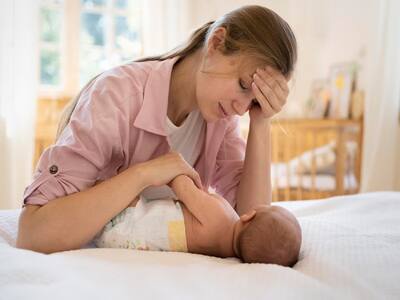
Symptoms of postpartum depression may develop gradually. A Psychologist suggests some healthy ways to cope with postpartum depression.
Postpartum Depression is also called postnatal depression. More than one in every ten women does experience this condition within a year after giving birth. It is a condition of a persistent feeling of sadness, low mood, anxiety, and lack of enjoyment after having a baby. This may affect not only the mothers but also the father and partners. The “baby blues” is the most commonly experienced feeling among new parents.
When to seek professional help for postpartum depression and how to cope with it? Meghna Karia, Senior Psychologist and Outreach Associate from Mpower, answers this question and more here.
Signs that indicate you’re suffering from postpartum depression
A lot of women are not able to identify and understand the symptoms as they may even develop gradually. Some of the signs which can be felt any time in the year after delivering the baby are:
- Difficulty sleeping at night.
- Experiencing a lack of energy and motivation to do any activities.
- Finding it tough to take care of yourself and the baby.
- Bouts of sadness for a prolonged period.
- Feeling anxious throughout the day.
- Frightening thoughts of hurting your baby.
- Social isolation- the feeling of not wanting to come in contact with relatives, friends, and close ones.
- Feeling fatigued.
These signs may last for two weeks or at times even more. It may even continue for a longer period. Hence, it is important to identify it at the right time and seek professional help. You can gently remind yourself that it is something that is common, and it can happen to anyone. There is always access to support available.
Things that make new mothers prone to postpartum depression
The cause of experiencing postpartum depression could be for various reasons:
- Family history of having mental health conditions.
- Having a difficult relationship with the partner.
- Stressful events in the past or the present.
- Lack of support system.
- Past trauma and domestic violence.
- Adjustment issues with interpersonal relationships.
Additionally, it’s not just these reasons necessarily but it could also be because of life transitions, and having a new being is altogether a new situation with new changes. However, an open mind to manage this transition and grow through it is the key to preventing this condition.
Ways to cope with postpartum depression
Some of the healthy ways to cope with postpartum depression are:
- A support group is one of the best outlets to share your feelings, and thoughts, gain new insights, and sail through it together. Joining an antenatal group while you are pregnant may serve a long way. While listening to other pregnant women, you may be able to resonate with your journey better and the insights you receive just by meeting periodically and having a conversation itself helps you stay calm.
- Exercise and nutrition are the best companions at any point and any stage or phase of life. Proper nutrition, physical movement, and adequate sleep can completely change the weather of your mind and body. These are natural ways of secreting hormones in your bloodstream which affect every system of your body. And these are important elements for your brain health. Hence cultivating healthy habits in your daily routine is the first fix to be done in your routine.
- CBT: Cognitive Behavior Therapy is one of the scientifically proven tools developed by Dr. Aaron Beck. This tool helps us to identify our triggers, activating events followed by the feelings and emotions you may feel, the way you behave or take actions followed by the consequences that it leads to. This tool has proven to be effective in altering your distorted thoughts and irrational beliefs which affect your behavior and mood. This tool can be learned and exercised only after visiting a therapist who has the right knowledge and can help you in using this tool for different challenging situations during your depressive episodes.
- Rebuilding a support system: Especially during the depression period, it is highly recommended to have a strong support system. It could be just three to four people, doesn’t matter how many people but having healthy bonds and good quality relationships where you can spend time together, talk about the solutions, step out for a small experience, pursuing some hobby together does help a long way to overcome the rough phases of your life.
COVID-19 Effects On Maternal Health
Needless to say, the COVID-19 pandemic resulted in an increased prevalence of mental health problems such as stress, anxiety, and depression around the world. The outbreak of the infectious disease had a devastating effect on maternal health.
Meghna expounds, “Because of the restrictions and staying indoors and the unprecedented times, women had suffered from metabolic disorders like abnormal cholesterol, high blood sugar and blood pressure. Additionally, many women also experienced anxiety of contracting the infection, perinatal infection stress and overall being uncertain about how different situations with the newborn baby would be managed during COVID times. It’s also the preparedness stress which women faced during COVID-19 which was further debilitating.”
READ RELATED: How To Take Care Of Your Body After Giving Birth: Challenges Of Postpartum Care
Common Myths About Postpartum Depression
The psychologist also debunked some of the common myths and misconceptions about postpartum depression.
Myth 1: I have postpartum depression because I’m a weak woman.
Fact: It’s not just being weak women, even the strong women can go through this phase. It’s not because of weakness or failure on your end. It has a lot to do with hormones, nutrition, extrinsic environment and support system.
Myth 2: Postpartum depression can happen only in a few months of the year.
Fact: It’s not necessary to happen in the initial months. It can develop gradually any time after giving birth. It could also happen after 6 months or 8 months or even after a year depending upon your state of mind and mental health.
“Nevertheless, postpartum depression is very much curable, and one can prevent it by taking proper care, seeking professional help, focusing on eating nutritious food, exercise and self-care,” concludes Meghna Karia.
According to WHO estimates, about 13 per cent of new mothers (women who have just given birth) worldwide suffer from a mental disorder, mostly depression. A higher prevalence of mental disorders among new mothers is seen in developing countries, where more 19 per cent of women experience a mental disorder after childbirth. In developing countries, about 20 per cent of new mothers in experience clinical depression, according to the UN health agency.
Total Wellness is now just a click away.
Follow us on
window.addEventListener(‘load’, (event) => {
// $(document).ready(function(){
$(‘#commentbtn’).on(“click”,function(){
(function(d, s, id) { var js, fjs = d.getElementsByTagName(s)[0]; if (d.getElementById(id)) return; js = d.createElement(s); js.id = id; js.src = “//connect.facebook.net/en_US/sdk.js#xfbml=1&version=v2.3”; fjs.parentNode.insertBefore(js, fjs);}(document, ‘script’, ‘facebook-jssdk’));
$(“.cmntbox”).toggle();
});
// });
});







